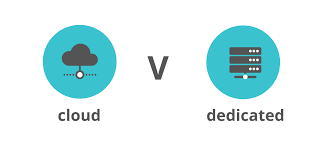The internet has now reached every corner of the globe. Everything currently is done over the internet, from social networking to social media influence. Everything is available online, whether it’s a TV show or music. Many commercial enterprises are in the same boat. A dedicated website, on the other hand, is required for a business to succeed online, and a dedicated website requires a server to work properly. In this aspect, the debate over cloud vs dedicated servers is one that cannot be avoided and must be resolved at some time.
How Does Cloud Hosting Work?
In terms of functionality, a cloud hosting server is extremely similar to a dedicated server. Unlike a dedicated server, however, a cloud server does not require the presence of dedicated physical hardware. The cloud server operates within a virtual environment that is managed by the cloud hosting provider. You do not need to buy any hardware and merely pay for the space you use on the server to a dedicated server. Unlike a dedicated server, however, a cloud server does not require the presence of dedicated physical hardware. The cloud server operates within a virtual environment that is managed by the cloud hosting provider.
A cloud hosting server is analogous to an extravagant restaurant setup in several aspects. The restaurant has several tables, and each table has a waiter or waitress assigned to it. The waiters or waitresses are the resources that are allocated to you, and the tables are the Cloud VPS that you may utilize. When the total number of customers exceeds the capacity of a restaurant, another table can be added to the present design. As the number of tables grows, so does the number of waiters and waitresses assigned to that table. A cloud server functions in the same way. When your website receives a lot of traffic, extra resources are added to keep it up to date so that the efficiency does not suffer. When traffic starts to decrease and return to normal, resources are likewise lowered.
Cloud Server's Benefits
The advantages of a cloud server outweigh the disadvantages of a dedicated server.
- The first and most important benefit of using a cloud server is that you may choose from any plan offered by any firm. Because all of these systems operate on specialized custom stack software, you will be able to run any CMS website that works on LAMP. The purchase of a cloud server will not put a significant dent in your wallet.
- Several possibilities are based on the highest quality hardware configurations available, such as SSD storage choices, a database with several layers and load balancing on network traffic, various web file caching services, and various PHP services such as CDN integration, and so on. The combination of all of these elements allows CMS site owners to host their sites on a server that is quick, seamless, and responsive.
- When comparing shared hosting vs cloud hosting, the cloud server comes out on top since it can provide any CMS website with more RAM, I/O processes, and CPU cores. This ensures that the website will always be available, regardless of the amount of traffic it receives. The cloud server is constructed in such a way that it always directs the appropriate resources to ensure that a website runs smoothly. When more resources are required, it will obtain them, and when fewer resources are required, it will utilize the bare minimum.
Dedicated Hosting: What Is It and How Does It Work?
On the other hand, dedicated server hosting necessitates the presence of real hardware. This configuration must be purchased on your own, and it will require a devoted crew to maintain it working. For effective operation, all of its functions must be checked and updated on a regular basis.
A dedicated server may be likened to a restaurant in the same way that cloud server hosting can be compared to a restaurant. In the event of a cloud server, a large number of customers can enter and exit the restaurant based on their demands. You are the restaurant’s owner if you hire dedicated servers. In this restaurant, there are no smaller tables for smaller parties. One massive table takes up the entirety of the restaurant and is available for your use. Regardless of whether you use their services or not, all of the waiters and waitresses in that restaurant are devoted to that one table at all times.
Dedicated Server's Benefits
When it comes to cloud versus dedicated servers, dedicated servers do better than cloud servers simply because you pay more for them. The following are some of the main benefits of getting a dedicated server:
- The most important benefit of a dedicated server is that it can be configured by any web developer or administrator to manage whatever amount of traffic the site is projected to get.
- The dedicated servers are structured in such a way that even if the website is not functional during peak traffic times, it will continue to function normally.
- The problem of flexibility does not present with a dedicated server when comparing cloud versus dedicated server performance. Web developers may create custom solutions to every challenge. Whether you need to install a second operating system for a webserver or wish to integrate performance-enhancing features like a page caching system, a dedicated server can help. If your website deals in eCommerce, publishing, media, or other similar services, it is likely to receive a significant level of traffic, which a dedicated server is built to handle.




